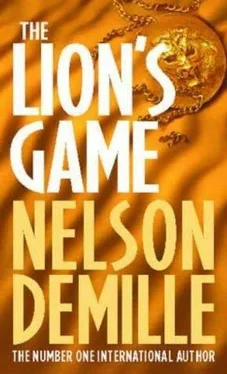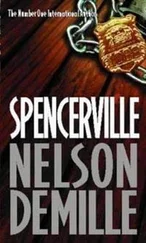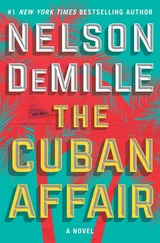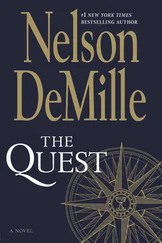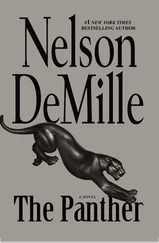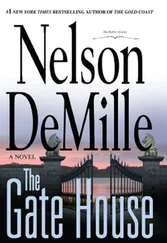He completed the refueling procedure, then went to a glass booth where he put two twenty-dollar bills through the small opening. The man glanced at him, and Khalil thought the quick look was not friendly. The man put his change on the ledge and announced the amount, then turned away from him. Asad took the change and went back to his car and got in.
He drove back to the Interstate and continued south.
This was the state of Virginia, he knew, and he noticed that the trees were more fully leafed here than in New York or New Jersey. His digital outside thermometer told him it was 76 degrees Fahrenheit. He pushed a button on the console and the temperature was displayed as 25 degrees Celsius. This was a pleasant temperature, he thought, but there was too much humidity here.
He continued on, keeping up with traffic that moved at over 75 miles per hour, much faster than north of Washington, and ten miles an hour faster than the posted speed limit. One of his briefing officers in Tripoli, Boris, the Russian KGB man who had lived five years in America, had told him, "The police in the South are known to stop vehicles that have license plates from the North. Especially from New York."
Khalil had asked why, and Boris told him, "There was a great civil war between the North and the South in which the South was defeated. They harbor much animosity because of this."
He'd inquired, "When was this civil war?"
"Over a hundred years ago." Boris explained the war to him briefly, then added, "The Americans forgive their foreign enemies in ten years, but they don't forgive each other so quickly." Boris added, "But if you stay on the Interstate highway, it will be better. This is a route heavily traveled by people from the North, who take their vacation in Florida. Your automobile will not attract undue attention."
The Russian further informed him, "Many people from New York are Jews, and the police in the South may stop a car from New York for that reason." The Russian had laughed and told him, "If they stop you, tell them you don't like Jews either."
Khalil thought about all of this. They had tried to make light of his driving in the South, but clearly they knew less about this place than they knew of the territory between New York and Washington. Clearly, too, this was a place that could cause him problems. He thought of the gasoline attendant, thought of his New York license plates, and also thought of his appearance. Boris had also told him, "There are not many races of people in the South-mostly they are black Africans or Europeans. To them, you look like neither. But when you get to Florida, it will be better. There are many races in Florida, and many skin colors. They may think you are South American, but many people in Florida speak Spanish and you do not. So, if you need to explain yourself, say you are Brazilian. In Brazil, they speak Portuguese and very few Americans speak that language.
But if it is the police you are talking to, then you are Egyptian, just as it says on all your identification."
Khalil reflected on Boris' advice. In Europe, there were many visitors, businessmen, and residents from Arabic countries, but in America, outside of the area of New York, his appearance might be noticed, despite what Malik had said to the contrary.
Khalil had discussed this with Malik, who told him, "Don't let that idiot Russian worry you. In America you only have to smile, don't look suspicious, keep your hands out of your pockets, carry an American newspaper or magazine, tip fifteen percent, don't stand too close when you speak, bathe often, and tell everyone to have a good day."
Khalil smiled at the image of Malik telling him about Americans. Malik had concluded his assessment of Americans by saying, "They are like Europeans, but their thinking is more simple. Be direct, but not abrupt. Be friendly, but not familiar. They have a limited knowledge of geography and other cultures, less so than the Europeans. So if you want to be a Greek, be a Greek. Your Italian is good, so be from Sardinia. They've never heard of the place anyway."
Khalil directed his attention back to the road. The Sunday afternoon traffic was sometimes heavy, sometimes light. There were few trucks on the road because it was the Christian Sabbath. The scenes on either side of the road were mostly of fields and forest with many pine trees. Occasionally, he would see what appeared to be a factory or a warehouse, but like the Autobahn, this road did not come close to cities or areas of population. It was difficult to imagine here that America held over 250 million people. His own country held not even five million, yet Libya had given the Americans much to worry about since the Great Leader had deposed the stupid King Idris many years ago.
Khalil finally let his thoughts go back to the house of General Waycliff. He had been saving these thoughts, like a sweet dessert, to be enjoyed at his leisure.
He re-created the entire scene in his mind, and tried to imagine how he might have gotten more pleasure from it. Perhaps, he thought, he should have made the General beg for his life, or made the wife get on her knees and kiss his feet. But he had the impression that they wouldn't beg. In fact, he had extracted all he could from them, and any further attempts to make them plead for mercy would have been unsatisfying. They knew they were going to die as soon as he revealed his purpose in being there.
He thought, however, that he could have made their deaths more painful, but he was restricted by the necessity of making the murders look as though they were part of a theft. He needed time to complete his mission before the American Intelligence organizations began to comprehend what was happening.
Asad Khalil knew that at any point in his visits to the men of the Al Azziziyah squadron, the police could be waiting for him. He accepted this possibility and took comfort in what he had already accomplished in Europe, at the New York airport, and now at the house of General Waycliff.
It would be good if he could complete his list, but if he could not, then someone else would. He would like to return to Libya, but it was not important that he do so. To die in the land of the infidel on his Jihad was a triumph and an honor. His place in Paradise was already secure.
Asad Khalil felt as good at this moment as he'd ever felt since that terrible night.
Bahira. I am doing this for you as well.
He approached the city of Richmond, and the traffic became heavier. He had to follow the signs that took him in a circle around the city, on a highway called 1-295, then finally back to 1-95, heading south again.
At 1:15 P.M., he saw a sign that said WELCOME TO NORTH CAROLINA.
He looked around, but noticed little difference from the state of Virginia. The Russian had warned him that the police in North Carolina were slightly more suspicious than the police in Virginia. The police in the next state, South Carolina, would be even more likely to stop him for no reason, and so would the police in Georgia.
The Russian had also said the police in the South sometimes traveled in pairs, and sometimes drew their weapons when they stopped a vehicle. Therefore, shooting them would be more difficult.
Boris had also warned him not to offer a policeman a bribe if he were stopped for a driving violation. They would most likely arrest him, according to the Russian. This, Khalil reflected, was the same as in Europe, but not in Libya where a few dinars would satisfy a policeman.
He continued on the wide, nearly straight Interstate highway. The vehicle was quiet and powerful and had a large fuel tank. But he could tell by the computer that he would have to refuel two more times before his destination.
He thought about the man he would visit next. Lieutenant Paul Grey, pilot of the F-lll known as Elton 38.
Читать дальше
